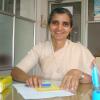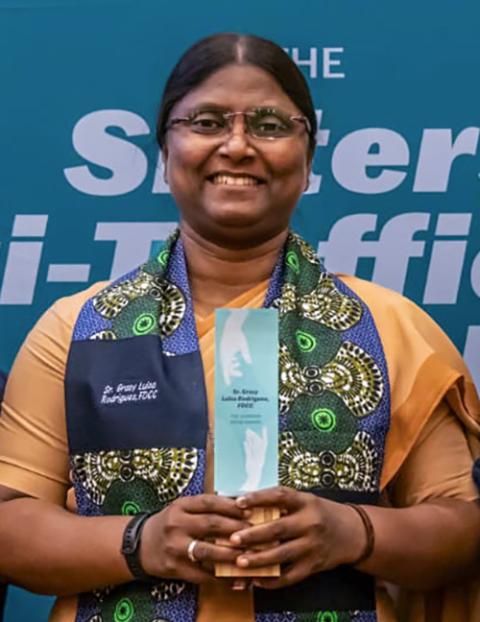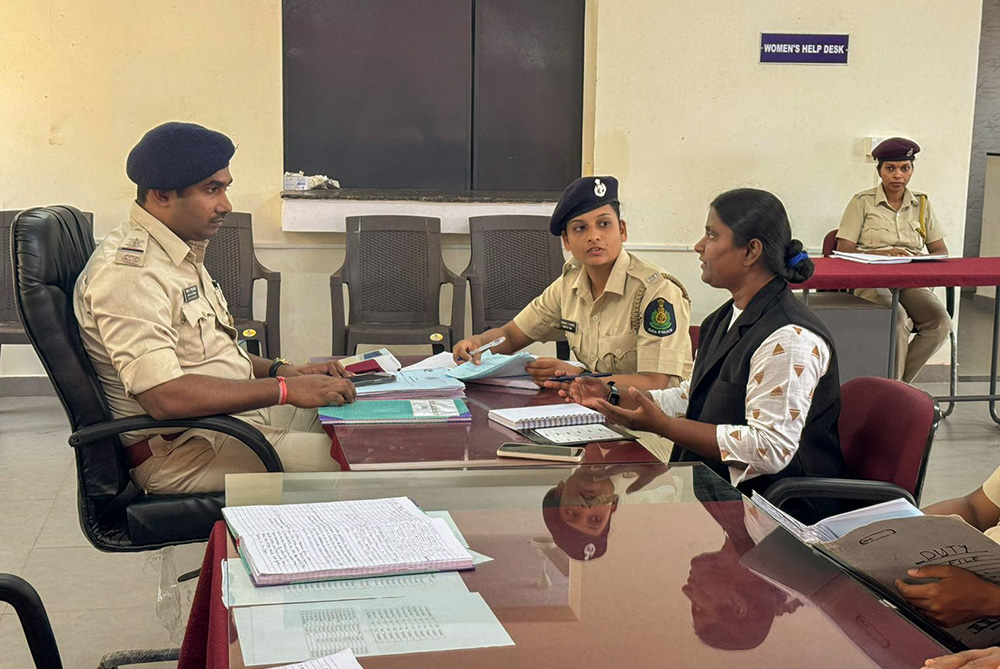
Canossian Sr. Grasy Rodrigues discusses a rape case with police personnel at Mandarem, Goa, western India. (Courtesy of Grasy Rodrigues)
Canossian Sr. Grasy Luisa Rodrigues received the Common Good Award at the Sisters' Anti-Trafficking Awards May 23, 2024, in Rome for saving trafficking victims for the past 13 years.
She also educates youth about the Indian Juvenile Justice Act, cyber safety and online exploitation, child labor, health and hygiene, and children's rights and protection.
The 45-year-old nun organizes human trafficking awareness campaigns in hotels, colleges, villages, schools and slums with the support of law enforcement agencies. She helps rehabilitate the rescued and works with networks such as the International Justice Mission and Justice and Care.
In 2022, Rodrigues became a founding member of Mukti Kiran (Ray of Liberation), an organization that works with Goa police to prevent human trafficking.
Rodrigues, who lives in Goa's Arambol village, shared with Global Sisters Report how she entered social work and contributed to society.
GSR: How do you feel about receiving this award?
Rodrigues: I feel happy, deeply humbled and grateful to my God for such recognition bestowed upon me.
At the same time, I am aware that this acknowledgment is not just a personal achievement. It's a testament to the collective efforts of key stakeholders, such as my Canossian sisters, church institutions, individuals, government and nongovernment organizations, police officials, and Asian Movement of Women Religious against Human Trafficking (AMRAT), the Indian unit of Talitha Kum international network of consecrated life against trafficking in persons.
Why were you given this award?
The awards are given to women religious who have shown exceptional courage, creativity [and] collaboration in protecting their communities from human trafficking. I received the Common Good Award presented by Arise Foundation [founding] president John Studzinski.
What motivated you to take up social work?
I wanted to become a teacher in my juniorate and was teaching in our school in Mumbai's Andheri area. In 2003, my life took a turn. My throat began to trouble me as I am allergic to chalk dust. The doctors advised me either to change my profession or undergo surgery. The teaching job was dear to me. I made a discernment retreat and realized God had a different plan for me.
I did my master's in social work at SNDT Women's University, Mumbai. As I began my studies, a miracle happened. My throat problem was completely healed without medication or surgery. I took it as a real sign from God to dedicate myself to social work ministry.
Are you happy that you changed your mission field?
Yes, I feel very contented. What drives me in this cause is my unwavering belief in the inherent dignity and worth of a human. Human trafficking strips individuals of their most basic rights, their freedom and their dignity.
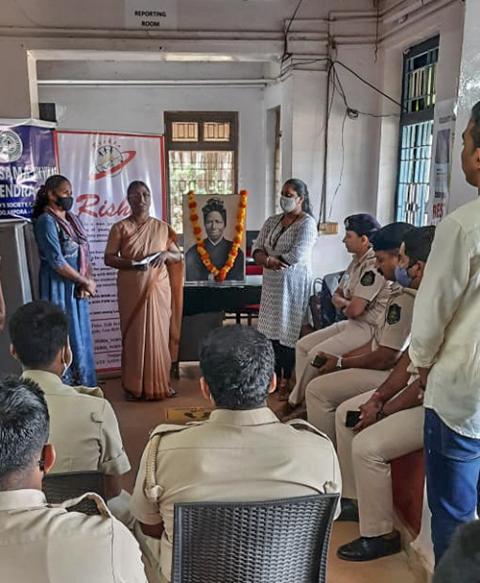
A human trafficking awareness session at the Calangute Police Station in Goa was held on the feast of St. Josephine Bhakita, the patron saint of the victims of human trafficking. (Courtesy of Grasy Rodrigues)
St. Josephine Bakhita, a Canossian nun [from] Sudan (1869-1947) has been a source of inspiration to me. My Canossian charism to follow Christ crucified compels me to move out into the periphery where the poorest of the poor dwell.
In 2010, I was challenged by Bethany Sr. Jyoti Pinto, who started AMRAT in India. She told me our congregation has St. Josephine Bakhita, and now it's my turn to join the new forum.
Since then, I worked for the victims of trafficking — its prevention, the rescue of the victims, accompanying them to doctors and rehabilitating them. I also provided them [with] counseling, prepared a home inquiry report, worked out a compensation scheme and initiated a legal investigation.
What are your target groups, and how do you help them?
Women, children, youth, migrants, victims of human trafficking, and the village communities. We try to meet their various needs: be they psychological, mental, emotional, economic or educational.
We find them jobs [and] educate them about their rights and justice issues. We have helped form self-help groups and conduct tailoring, beautician and bag-making courses.
Do you have support from your congregation?
My congregation is the greatest support for me. We, as a community, discuss, plan, evaluate and implement the projects, so there is lots of unity and collective support from my sisters. I believe it's a community mission, and I always find my sisters' accompaniment and endless support in this ministry.
Advertisement
Any memorable incident in your ministry?
My first rescue operation was in 2013 at Kamathipura, Mumbai's red-light area. I met Maya (name changed), a 16-year-old girl, in a brothel. She told me, "Didi (elder sister), if you had come a few hours early, I would have been saved from this horror. Last night, I was abused by nine."
Rescuing her was a turning point in my life. It gave me an insight into the reality of the women in brothels. Maya's dimly lit room was stinking, with piles of condom cartons. Through this experience, God gave me more courage to walk ahead in my mission. I have had many such striking experiences.
I have found human trafficking a networked crime, and it is not easy to fight against it. It is a long and arduous journey, fraught with setbacks, challenges and risks. But with God's grace, it is a journey worth undertaking, a cause worth fighting.
I want to fight this battle through compassion in action. I want to take one step at a time, one victim at a time. This will bring about a transformation in society, of course, with God's grace.
Do you have a message for young women religious who want to join social work?
My message to them is: Be strong in prayer, seek guidance and discernment from God in your mission. Work in collaboration with your sisters and strengthen your collective networks. We find hope in the power of collective action, in the knowledge that when we stand together, we can effect real and lasting change. Let us be pilgrims of hope, bringing dignity, peace and hope to every person we work [with].
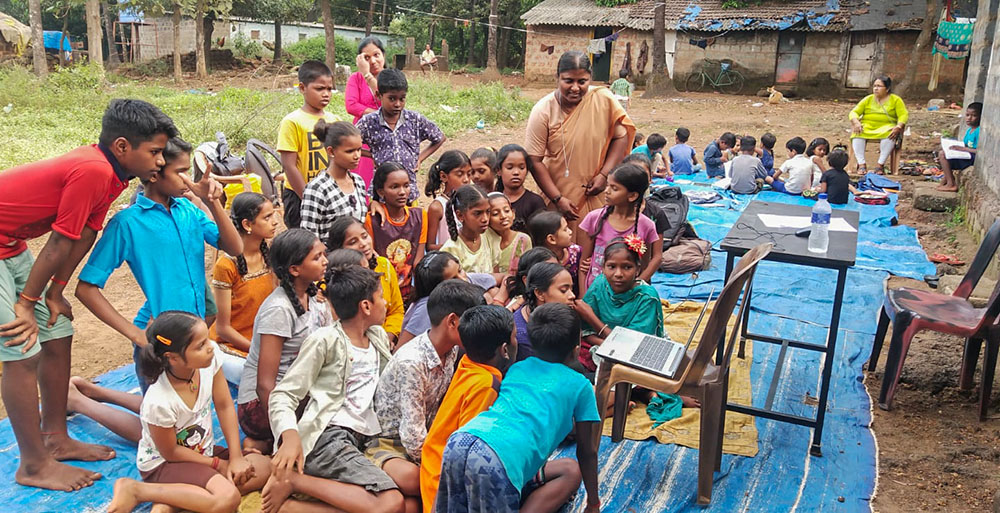
Canossian Sr. Grasy Rodrigues leads a session with migrant workers' children on child rights. (Courtesy of Grasy Rodrigues)
How serious is human trafficking in India?
People are frequently trafficked through India for commercial sexual exploitation and forced or bonded labor [in various parts of the world]. Although no reliable study of forced and bonded labor has been completed, one study estimated the problem affects 8 million Indians.
Goa is a major tourist destination in India. Tourism plays a significant role in shaping Goa's economy, but it also pushes human trafficking. A large number of women and children fall prey to traffickers, particularly during the time of tourist inflow. Young boys, girls and women are most vulnerable to the varied nature of exploitation in Goa.
The traffickers target marginalized tribal communities, unsupervised children in public places, and children of migrants. Sex trafficking victims are not just Indians; they come from around the world.
The victims are lured by agents (and sometimes by persons known to the victims) on the false pretexts of marriage or for jobs in beauty parlors, spas, construction sites, [the] hotel industry or as domestic workers. The "recruitment" also happens through social media and advertisements.
In Goa, car and motorcycle taxis are the modes of transportation. These taxis move trafficked girls within Goa to attend [to] customers.
Goa is the money-making destination for agents. They pretend to be the victim's partner to avoid suspicion while entering the Goa border. The kingpins of trafficking are located outside Goa and [are] never arrested.
Another problem in combating trafficking is the lack of coordination between the police in the source transit and the destination. Goa requires special courts to try trafficking cases, as it is a major destination for sex trafficking. This will help speed up the trial, enable the victim to depose in the court and facilitate conviction of the accused.
